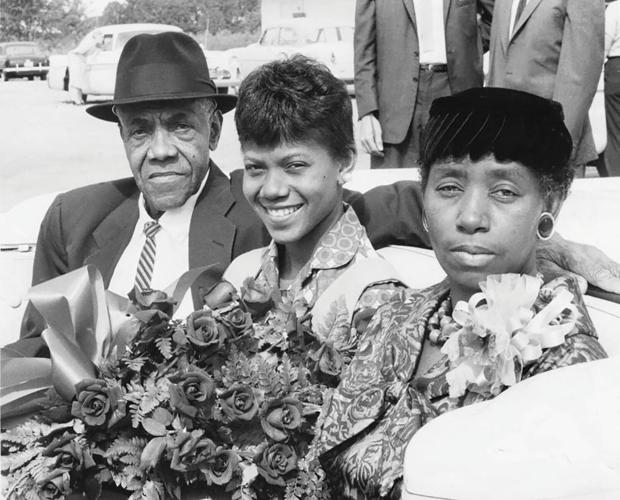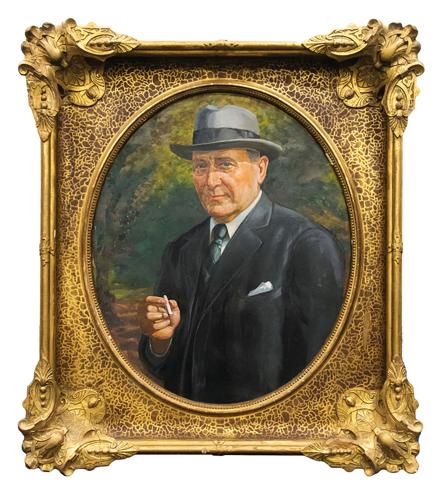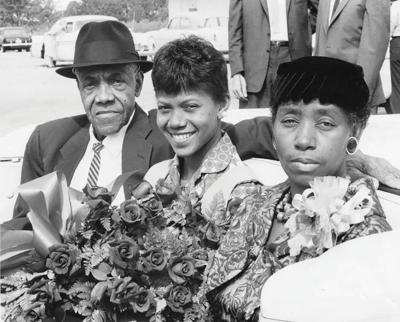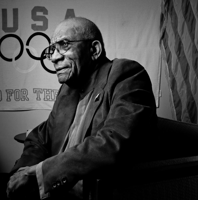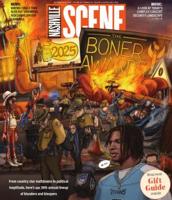On July 7, 1924, a team of a half-dozen Americans put up a score of 363 in the men’s trap-shooting team competition at the Paris Olympics. Among them: 36-year-old Nashville attorney John Hopkins Noel Sr.
That 363 was three points better than Canada and scored the U.S., including Noel, a gold.
It was the last gold medal awarded in the team trap competition, but it was the first gold medal awarded to a Tennessean. Noel, an accomplished sportsman and top-level shooter despite a severely injured left hand, spent the rest of his life managing his family’s trust and investing in real estate, including notably Nashville’s Noel Hotel.

An oil portrait of John Hopkins Noel
Now, 100 years later, the Olympics return to Paris with more Nashvillians vying for gold. But in the century between the Games’ two visits to the City of Lights, the Music City has added its grace notes to the Olympic tune.
Many of those notes were played by ’Belles. In the legendary coaching tenure of Ed Temple, the TSU Tigerbelles won 23 Olympic medals between the 1952 Games in Helsinki and the 1992 Games in Barcelona.
What’s remarkable is that, in a segregated South before Title IX, Temple couldn’t even offer scholarships to his runners. Still, he coached legends like Wilma Rudolph, who was born the 20th of 22 children in Clarksville and overcame a childhood riddled with illnesses. Rudolph won her first medal, a bronze, anchoring the 4 x 100 meter relay at the 1956 Melbourne Games. She was just 16; the other three team members were Tigerbelles. She was the celebrity star of the 1960 Games in Rome, where she won the 100-meter and 200-meter and anchored the gold-medal-winning, all-Tigerbelle 4 x 100-meter relay, the finals of which were run in sweltering temperatures that Temple — who coached the 1960 and 1964 U.S. track teams — had anticipated: He had his Tigerbelles practice three times a day on the unforgiving cinders of the TSU track in the unrelenting Nashville heat of June and July.
“It’d get you ready,” he told the Scene in 2012.
Even after another Tigerbelle-heavy winning performance in 1964 in Tokyo, Temple couldn’t get a raise at TSU — “We’d won more medals than 80 countries!” he exclaimed to the Scene — until Tennessean sportswriter David Halberstam (yes, that one) set up a meeting between Temple and then-Gov. Frank Clement. Temple got his raise.
Ed Temple came to Nashville from Pennsylvania in 1946 — drawn by a track scholarship to what was then called Tennessee A&I. He's never left.
Temple never coached a U.S. team again — he said he’d done it, and watching on TV was a more enjoyable experience — but he was supposed to. He’d be named the coach for the 1980 Games in Moscow, but the U.S. and many of her allies stayed at home in boycott after the Soviet invasion of Afghanistan, creating a cohort of would-be Olympians who never got to show their mettle against the world’s best on the biggest stage in sports.
Among them: Franklin’s Joan Pennington, one of the country’s top swimmers, then competing at the University of Texas.
Four years later, when the Games came to Los Angeles, Nashville swimmer Tracy Caulkins became the most famous Middle Tennessee Olympian since Rudolph, winning three gold medals … two of them on the same day. Glitzed and glammed and spectacled through Hollywood magic and sparkled by Ronald Reagan’s “Morning in America” happy (cold) warrior muscle, the ’84 Olympics inspired not just athletes but local politicians to get in on the action — including Nashville Mayor Richard Fulton.
Fulton had ambitions of Nashville as a world-class city; in 1976, he brought the U.N. to Nashville for its first-ever meeting outside of New York, for example, and he openly lobbied for various pro sports leagues (established and upstart alike) to come to town. And the United States Olympic Committee’s ambition to bring the Games stateside in 1996 gave him another shot to propel the city onto the world stage. Of course, those Games ended up in Atlanta, but this wasn’t totally a case of Nashville’s constant late-20th-century desire to be Atlanta without being Atlanta. You can wrestle for yourself what exactly was meant by that, but there was an overwhelming opinion at the time of, “Why should Atlanta get this or that instead of Nashville?” existing simultaneously with the opinion, “We don’t want to turn into Atlanta.”
Nashville was one of four cities that submitted formal bids to the USOC — Atlanta, San Francisco and Minneapolis were the others — and it was considered a longshot. But so was Atlanta’s bid. San Francisco was the far-and-away favorite, tempered only by the hesitance that the last U.S.-based games were also in California. Fulton — and his successor, Bill Boner, who took over in 1988 — laid out a plan, with a price tag of $770 million (almost $2.1 billion today), that would have spread venues throughout the county.
Among the proposed locations for the Olympic stadium: the East Bank, where Nissan Stadium is. (Also considered: the fairgrounds, Bells Bend and “southeast Davidson County” — there truly is nothing new under the sun.) And where would the new arena be? At Fifth and Broadway, naturally. What’s clear is that while Fulton’s plan seems fruitless in hindsight, it certainly shaped — if not outright inspired — Nashville’s future stadium and, frankly, general planning strategy.
The Atlanta Games were the first not to be declared “the greatest” by the IOC chairman at the closing ceremony (the terror attack and various logistical problems were to blame), but in retrospect, it’s seen as a seminal event in the highwater era of New South boosterism coinciding with the Clinton-Gore administration: proof that indeed the South was a full, contributing, even progressive member of society. There’s debate whether that’s true, of course, but the Olympics are often more about what we think they mean than what they actually mean, and the cities of the South proving their worth went a long way to scoring Nashville an expansion NHL franchise and wooing the NFL’s Oilers.
Interestingly, Nashville was among the two dozen or so cities the USOC asked in 2013 to submit bids to host the 2024 Games. And in a Butch Spyridon-era, “It City” universe overseen by Mayor Karl Dean — who, along with Phil Bredesen, fulfilled much of Fulton’s vision for the city (and more), for good or ill — it’s a little surprising the city didn’t give it a shot.
But it’s not a far stretch to say the furtive footsy Fulton played with the USOC in the ’80s laid the groundwork for the city Nashville is today.
Profiling the Walsh sisters and others heading to Paris, chatting with past Olympian Shawn Johnson East and much more

